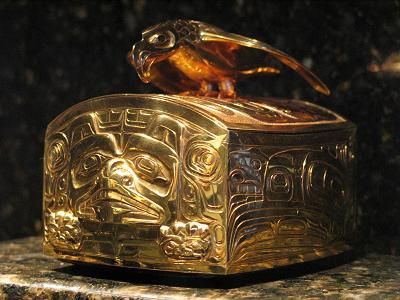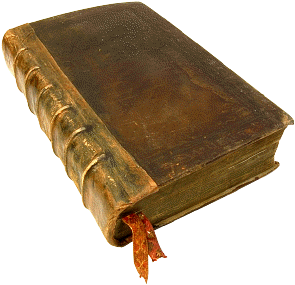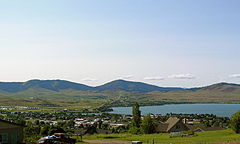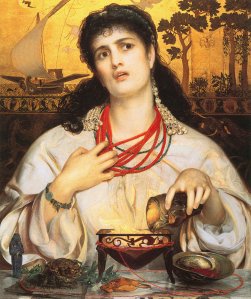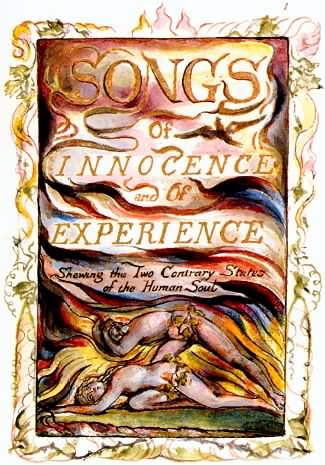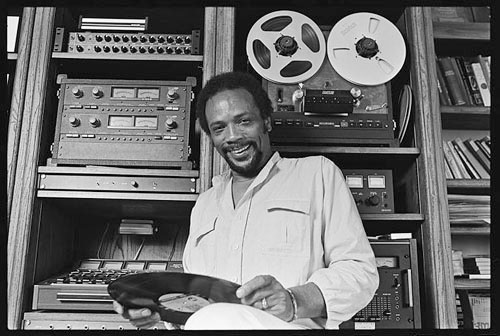Box by Bill Reid
Chapters 1-6 (By Meena)
1. Word: Miles Davis
Shiny black boots (a size too small but worn by Miles Davis). (Pg. 12)
Definition: He was an American jazz musician and composer
(May 26, 1926 – September 28, 1991)
Synonyms: None.
My thoughts: Someone famous, possibly a musician that Junior’s dad aspired to be like.
Some of our teachers make us eat birdseed so we’ll feel closer to the earth, and other teachers hate birds because they are supposedly minions of the Devil. (Pg. 30)
Definition: a servile follower or subordinate of a person in power.
Synonyms: Follower, subordinate, crony
My thoughts: Birds are symbols that represent evil and the Devil’s underworld, therefore the teachers are not fond of birds.
3. Word: coot
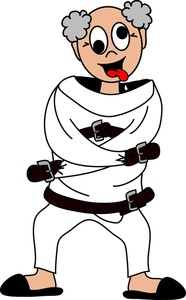
He is a weird old coot, but most of the kids dig him because he doesn’t ask too much of us. (Pg. 29)
on, especially one who is old.
My thoughts: I assumed coot was being used to describe Mr. P as a strange and odd character.
4. Word: decrepit
And let me tell you, that old, old, old, decrepit geometry book hit my heart with the force of a nuclear bomb. (Pg. 31)
Definition: weakened by old age; feeble; infirm
Synonyms: old, frail, weak
My thoughts: Junior thought the geometry book was old and useless as well as outdated.
5. Word: Humanoid
I mean my sister had become a humanoid underground dweller. (Pg. 39)
Definition: having human characteristics or form; resembling human beings.
My thoughts: The sister became a person who enjoyed living underground in darkness like some particular animals such as ground hogs.
Chapter 6-12
Word #1 loser
“Rowdy was our star quarterback and kicker and middle linebacker, and I was the loser water boy” (49).
definition: (slang) a misfit, especially someone who has never or seldom been successful at a job, personal relationship, etc.
antonym: achiever, winner
Comment: I chose this word because different students define it differently. Asking students to define the term would be a critical-thinking exercise for them where they question, confirm, or revise their understanding of the term.
Word #2 mutilate
“Can you imagine what would have happened to me if I’d turned around and gone back to the rez school? I would have been pummeled. Mutilated. Crucified” (55).
definition: to injure, disfigure, or make imperfect by removing or irreparably damaging parts
synonym: maim
comment: I chose this word because some students might not know it. Also, at this point in the novel, we can ask students to discuss why Arnold would be “mutilated” by his peers at Wellpinit and positive/negative effects on a community’s expectations upon a person.
Word #3 Indian
“Maybe I could just drop out of school completely. I could go live in the woods like a hermit. Like a real Indian.”
“once I arrived at Reardan, I became something less than less than less than Indian” (83).
definition: a member of the aboriginal people of America or of any of the aboriginal North or South American stocks, usually excluding the Eskimos
comment: I chose this word because some students may not know that using this word to address aboriginal people is inappropriate. Also, defining this term is challenging for many students because they don’t know much about Native American people and their lives today. Discussion on this word would encourage them to research how “a real Indian” lives and see if they live “like a hermit”, just like what Arnold has said.
Word #4 nomadic –> nomad
“my sister had married a lopsided, eagle-nosed, nomadic poker player” (90)
definition: a member of a people or tribe that has no permanent abode but moves about from place to place, usually seasonally and often following a traditional route or circuit according to the state of the pasturage or food supply
synonyms: migrant, wanderer, roamer
comment: The word is important because it describes Arnold and Mary as well. Unlike their parents and relatives who have never once moved out of their community (Spokane Reservation), Arnold and Mary take risks and step outside of their comfort zone to look for hope and better lives.
Word #5 warrior
“I thought we were being warriors, you know? And a warrior isn’t afraid of confrontation” (91).
definition: (1) a person engaged or experienced in warfare; soldier (2) a person who shows or has shown great vigor, courage, or aggressiveness, as in politics or athletics
synonyms: fighter, battler, challenger
comment: This is another word that describes Arnold and Mary. Both of them never gives up fighting for their brighter futures. Arnold confronts Mr. Dodge and Roger and succeeds in humiliating them for making racist jokes. Mary also opposes her parents by leaving her community.
Note: definitions from Dictionary.com
Sara: Word Warlock: Chapters 11-16
Chapter 11: “Traitor” (79) (n): a person who betrays a friend, country, principle.
Synonyms: betrayer, backstabber,double-crosser.
I chose this word because Junior is in such an impossible situation. If he does not follow his dreams, he will be a traitor to himself.
Chapter 12: “Tautologies” (92) (n): the saying of the same thing twice in different words, generally considered to be a fault of style.
Synonyms: repetition, reiteration,redundancy.
I chose this word because I love how Gordy actually uses language like this and perhaps it also represents how these two characters are repeating each other and showing how the two of them are the same.
Chapter 13: “Polson” (100) (n):
Polson (![]() /nəˈkʌsp/) (Ktunaxa: kwat̕aq̓nuk [1]) is a city in Lake County, Montana, United States, on the southern shore of Flathead Lake. It is also on the Flathead Indian Reservation. The population was 4,488 at the 2010 census. It is the county seat of Lake County.[2] The city was named after pioneer rancher David Polson. (Wikipedia:http://en.wikipedia.org/wiki/Polson,_Montana)
/nəˈkʌsp/) (Ktunaxa: kwat̕aq̓nuk [1]) is a city in Lake County, Montana, United States, on the southern shore of Flathead Lake. It is also on the Flathead Indian Reservation. The population was 4,488 at the 2010 census. It is the county seat of Lake County.[2] The city was named after pioneer rancher David Polson. (Wikipedia:http://en.wikipedia.org/wiki/Polson,_Montana)
Chapter 14: “Respected” (103) (adj) a feeling of deep admiration for someone or something elicited by their abilities, qualities, or achievements:
Retroactive: applying to or referring to the past.
Context: Penelope describes Arthur’s suit as retroactive and radioactive. She by combining these similar sounding words she is implying that it is the suit’s antique nature that makes it stand out.
Penultimate: next to last.
Context: Considering the adoration the other students hold for Penelope, this nickname is probably not intended to mean that she is next to last. Instead, blending her name with the world -ultimate is intended to mean something like “ultimate-Penelope”.
Posterior: situated at the back or behind something,
Context: Since Roger prefers to use formal language, it is within the expectations of his character to use “posterior” to refer to a person’s bottom.
Chapters 24-29 (Corrina)
Reverse psychology:
1) how is it used in the text: Junior uses it in a cartoon panel where he tries to work out “How to get the last sip of wine from the bottom of the bottle” He shows Eugene, who died arguing over the last sip, saying “I didn’t want it anyway.”
2) dictionary definition: a method of getting another person to do what one wants by pretending not to want it or to want something else or something more.
3)my personal association: Huckelberry Finn – when he gets out of work by pretending it is fun so others will do it for him.
4) three similar words: reactive persuasion, Paradoxical intervention, manipulation
5) illustration to remember the word 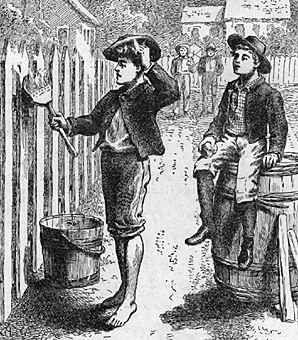
MEDEA: Written by Euripides, Medea is the story of a woman who helped Jason the Argonaut get the Golden Fleese, betraying her family and sacrificing her brother to attain it. She fled with him. When he told her that after all her sacrifices he was going to marry someone else, she killed their three children in a fit of rage.
1) how is it used in the text: Junior is grieving for the loss of his father’s best friend Eugene. His friend offers him a classical text, showing him a passage from Medea – he can connect with the all consuming sense of loss, rage and despair that Medea felt – this hopelessness that the Aboriginal community faces is thus connected to that of self-destruction originating from betrayal.
2) dictionary definition: Medea was a devotee of the goddess Hecate, and one of the great sorceresses of the ancient world. She was the daughter of King Aeetes of Colchis, and the granddaughter of Helios, the sun god.
3)my personal association: This is very similar to the Spanish Folktale, La Llorona, where a mistress murders her three children when the rich landowner she has been living with as a common-law wife tells her he is marrying someone else. In La Llorona the woman becomes a distraught ghost that searches the riverbeds for the lost souls of her murdered children, often trying to kidnap real children and taken them to Heaven with her so they will let her in. I taught various adaptations of La Llorona which is also featured in one of my favourite books, “Women who Run with the Wolves” by Clarissa Pinkola Estes.
4) three similar words:
5) illustration to remember the word
“In one of his plays, Medea says, what greater loss than the loss of wont’s native land? Well of course, man. We Indians have LOST EVERYTHING. We lost our native land, we lost our languages, we lost our songs and dances. We lost each other. We only know how to lose and be lost…. I mean, the thing is, Medea was so distraught by the world, and felt so betrayed, that she murdered her own kids. She thought the world was that joyless…”
“In like a lion”
1) how is it used in the text: It is a chapter heading. It introduces the chapter that describes Junior’s joining and succeeding at basketball ultimately winning against his former team.
2) dictionary definition: The term comes from an old farming expression:
“If March comes in like a lion, it will go out like a lamb?”
If March enters with bad weather, storms, floods etc… it will go out peacefully. It suggests that also in life, things that begin tumultuously often end well – the difficulty or trials faced in the early stages of an endeavour pave the way for future success.
3)my personal association: I have had many experiences where an early struggle was necessary for a peaceful ending. Sometimes you have to weather the storm in order to enjoy the good weather afterwards.
4) three similar words:
A dry March and a wet May?Fill barns and bays with corn and hay.
As it rains in March so it rains in June.
March winds and April showers? Bring forth May flowers.
(Farmers Almanac)
5) illustration to remember the word
“David and Goliath”
1) how is it used in the text: To illustrate the unfair advantage (in a basketball game) the privileged white school had over the under-nourished, poor Reservation school. By creating this parallel the white school is linked to a “giant” covered in armour – making it not really a fair fight. The residential school is thus “David” without armour, without resources other than their own wits and luck, which in this case, they do not have much of.
2) dictionary definition:
3)my personal association: I think a discussion of David and Goliath would work well in a classroom discussion about bullying. Goliath is known for his taunts, jeers, mocking tone and insults – it is this behaviour that causes the downfall of those who choose to become so offended they fight him. Not listening to bullies is a good message here. It is also a good tie in to the novels themes of injustice.
“Reservations were meant to be prisons, you know? Indians were supposed to move onto reservations and die. We were supposed to disappear. But somehow or another, Indians have forgotten that reservations were meant to be death camps. I wept because I was the only one who was brave and crazy enough to leave the rez. I was the only one with enough arrogance.”
4) similar: “the meek shall inherit the earth” “the lion and the mouse” (Aesops)
5) illustration to remember the word
1) how is it used in the text: Junior refers to himself as underestimated, during his basketball game with Rowdy. It is because Rowdy (representative of the angry, Indian community and reservation life) underestimates his abilities that he can out-manouver him and win the game.
2) dictionary definition: To judge at too low a value, rate, or the like. To think something is lower than it really is.
3)my personal association: This is one of my favourite quotes. “I found the power in being underestimated. It’s the greatest place to be.”- Quincy Jones
4) three similar words: depreciated, disparaged, misunderstood/ miscalculated/ misjudged, undervalued, belittled.
5) illustration to remember the word: QUINCY
